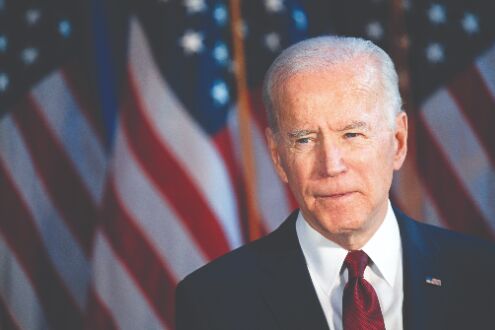A new direction
President-elect Biden’s approach to US-Iran diplomacy will likely follow a different path than the stances taken by both the Obama and Trump administration

As uncertainty continues over the smooth transition of power in Washington, can one be guardedly optimistic over the US-Iran relations? Will there be a quick reversal of the mayhem of the Trump Administration? Five takeaways are listed below:
Domestic priorities
For countries like Israel and Saudi Arabia, the Islamic Republic of Iran should be the urgent priority of the incoming administration in Washington. The incumbent is not ready to read the writing on the wall and is digging in for a prolonged, acrimonious and high-decibel court battle that could tear apart the American democracy. Even if he assumes office on 20 January without any major rapture, President-elect Biden's plate is overflowing. Fighting the Covid pandemic, overcoming racial tension, economic revival and navigating the Republican-controlled Senate (unless both the Georgian seats on 5 January special election go to the Democrats) will demand more attention and political manoeuvring. The Biden-Harris team also has to unify the highly diverse and deeply divided Democrats, especially its socialist elements. In short, Iran could be the last thing in the initial weeks of the Biden Administration.
Mending fences
While in office, President Trump was an antithesis of Dale Carnegie and worked overtime to transform friends into enemies. Through his ill-conceived moves, undiplomatic remarks and uncouth insults, he angered a host of international leaders. With the sole exception of Israeli Prime Minister Benjamin Netanyahu, President Trump made uncharitable remarks on a host of leaders and their policies. While defending his Covid 'record', he did not spare even Prime Minister Narendra Modi. Hence, the Biden Administration's time and efforts would be spent in mending fences, assuaging hurt sentiments and restoring their confidence in the US leadership. Restoring transatlantic friendship will be a prime objective. In the Middle East, the Biden administration will have to reassure Israel and Saudi Arabia that his administration will not abandon them midway.
Iran is important, but
Under President Trump, the scope for diplomatic solutions has evaporated, and his decision to withdraw from the nuclear deal destroyed the decade-long diplomatic path. He followed this with the renewal of American sanctions on Iran and its economy, institutions and individuals. Through a policy of 'maximum pressures,' President Trump sought to cow down the Islamic republic. In January when American special forces killed Qassem Soleimani, commander of the al-Quds forces, there were concerns about an escalation of tension and possible violence. The Trump Administration even bullied a host of countries, including India, to terminate their oil imports from Iran. While his policies added to Iranian hardships, increased by the Covid pandemic, President Trump could not secure the Iranian submission. The Islamic Republic of Iran is the elephant in the room, and President Biden will not be able to ignore it for long.
Trump's popularity in the Middle East
Events since July 2015 indicated that the nuclear deal is not a panacea for the Persian Gulf tensions. The Joint Comprehensive Plan of Action was popular everywhere except in the Middle East. A host of countries, including Israel and Saudi Arabia, read President Obama's diplomatic accomplishment as the formalisation of the Iranian hegemony in the Gulf and beyond. The nuclear deal was possible only because the Obama administration decided to ignore all other countries' concerns over the Iranian quest for regional hegemony and domination. Hence, the 'maximum pressure' policy was popular in the Gulf and was actively embraced by its friends. Indeed, using the Iranian threat, and with the tacit backing of Riyadh, the Trump Administration secured Israel's normalisation with Gulf Arab countries.
No revival of Obama's
Though he was part of the nuclear deal, President Biden will not blindly follow Obama's policy on Iran. He will have to learn from the mistakes of the nuclear deal, internalise its regional unpopularity and concerns of American allies. This would mean that diplomatic negotiations with Iran will not be confined to the nuclear file. To be credible and regionally acceptable, President Biden will flag a host of Arab and Israeli concerns vis-à-vis Iran. While he will have to end President Trump's policy, he will also have to modify the Obama administration's nuclear-only approach towards Iran, though he was part of that narrow policy.
When it comes to Iran, President Biden will have to balance between Obama and Trump. So, Tehran will have to wait for some time before celebrating President Trump's departure.
Views expressed are personal



